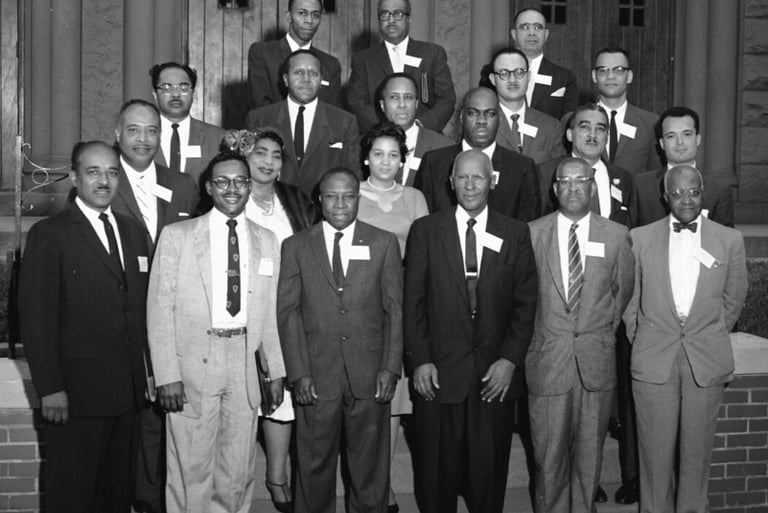Med-Chi is the oldest African-American Medical Society in the World.
One hundred years after its founding, Med-Chi celebrated its centenary status by laying a plaque in front of Dr. Robert Reyburn’s Washington, DC office on F street, N.W. During its over a century of service, Med-Chi has continued its fight against discrimination in the Washington, DC, area, with activities too numerous to mention here in detail. Outstanding are the following: In 1945, Med-Chi’s challenge to the practice of excluding black physicians from local hospitals resulted in the opening of Gallinger Municipal Hospital, later known as DC General Hospital, to black physicians in 1948. Med-Chi supported the effort to build a new full-service hospital on that site. Med-Chi’s discussions regarding membership in the Medical Society of the District of Columbia resulted in that organization opening its doors to admit black physicians as members in 1962. Since then, many Med-Chi members have served as presidents and in other meaningful capacities.
In 1939, Dr. W. Montague Cobb wrote and published a book called "The First Negro Medical Society." The second chapter of his book, called "The Door that Stayed Closed," describes the unsuccessful efforts of black physicians, with the aid of their white supporters, to gain admission to the Medical Society of the District of Columbia from 1869 to 1872. After this stormy, controversial period, the door to membership was closed to black physicians for 83 years until 1952. His book describes what happened in the various attempts to open that door.


During these attempts, Senator Charles Sumner of Massachusetts introduced a resolution in the U.S. Senate recommending the repeal of the charter of the Medical Society of the District of Columbia and " of such other legislation as may be necessary to secure for medical practitioners in the District of Columbia equal right and opportunities, without distinction of color." "I want a remedy and am indifferent to its form," the senator declared. The bill was brought to the Senate four times for a vote, but it was passed over each time.


Dr. Robert Reyburn, dean of the Howard University Medical School, played a key role in bringing this issue to the House of Delegates of the American Medical Association in 1870 in Washington, D. C., but, despite his best efforts, the door stayed closed.


In response, the Medic0-Chirurgical Society of the District of Columbia (Med-Chi) was formed in Dr. Reyburn’s Washington office on April 21, 1884. Med-Chi was created to benefit its members from regular meetings held for medical improvement and to serve public health. Maintaining the quality of scientific programs took precedence over other matters. Med-Chi’s Constitution was revised on June 2, 1938, to provide two annual black-tie memorial lectures to show appreciation for those who initially fought for equal professional rights and opportunities for black physicians in the District of Columbia. One of these would keep alive the memory of Senator Charles Sumner. The other was to be in memory of Med-Chi’s founders. As time passed, these two memorial lectures were combined into our present-day annual Founders-Sumner Lecture and Banquet. Med-Chi, an affiliate of the National Medical Association, was eleven years old when the NMA was organized in 1895. Med-Chi has always been one of the most active affiliates of the NMA.




Med-Chi is proud to have initiated the Imhotep National Conference on Hospital Integration in 1957, the principles which President Lyndon B. Johnson implemented in 1964.
As of this date, August 9, 2009, Med-Chi is 125 years old. Med-Chi is a historical treasure whose story is just beginning.




